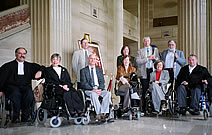Act Now

Empower U: Learn to Access Your Disability Rights Training on Canadian Human Rights, the Convention on the Rights of Persons with Disabilities (CRPD) and its Optional Protocol (OP) training aims to increase awareness of how to address discrimination using more familiar Canadian human rights laws such as Human Rights Codes and the newer international Convention on the Rights of Persons with Disabilities (CRPD). This is training for persons with disabilities by persons with disabilities. The training is part of a project funded by Employment and Social Development Canada and implemented by the Council of Canadians with Disabilities (CCD) in collaboration with Canadian Multicultural Disability Centre Inc. (CMDCI), Citizens With Disabilities – Ontario (CWDO), Manitoba League of Persons with Disabilities (MLPD) and National Educational Association of Disabled Students (NEADS). Read more.
Sign Up for our monthly digest
A monthly newsletter from CCD about what is happening in the community
Delta Airlines Inc. v Gábor Lukács
Related Documents
October 12, 2023
Travelling to the North to Gather Information towards Developing CTA Accessibility Regulations for Small Carriers and Terminals Not Covered by the Accessible Transportation for People with Disabilities Regulation (ATPDR)
March 15, 2018
Bill C-49 Empowers Goliath and Takes Away David's Sling Shot
March 14, 2018
Transportation Modernization Act (Bill C-49)
Media Release
For Immediate Release
BREAKING: 19 January 2018 - In the matter of Delta Airlines Inc. v Gábor Lukács, the Supreme Court of Canada (“SCC”) has decided that it is unreasonable for the Canadian Transportation Agency (the “Agency”) to apply a narrow criteria for determining which complaints can be heard. Specifically, the SCC held that such a narrow approach unreasonably prevents public interest groups such as the Council of Canadians with Disabilities (the “CCD”) from bringing complaints forward.
The SCC agreed with the CCD that “to refuse a complaint based solely on the identity of the group bringing it prevents the Agency from hearing potentially highly relevant complaints, and hinders its ability to fulfill the statutory scheme's objective.” The SCC found that the Agency's decision to deny Dr. Lukács' complaint based solely on his identity was unreasonable as it “did not maintain a flexible approach”.
Consistent with the CCD submission, the majority SCC decision held that a more appropriate criteria may be to consider whether the complaint raises a serious issue to be tried.
Of particular note is the Court's recognition that the Agency's decision was flawed as it did not allow those with most at stake to be heard.
The matter was heard on 4 October 2017. PILC lawyers Byron Williams and Joëlle Pastora Sala appeared before the SCC, along with pro bono counsel Alyssa Mariani of Thompson Dorfman Sweatman LLP (“TDS”), on behalf of the CCD. Sacha Paul of TDS was also an integral part of the team who worked on this case.
For full decision, see: https://scc-csc.lexum.com/scc-csc/scc-csc/en/item/16958/index.do
-30-
For more information contact:
Bob Brown, Chairperson CCD Transportation Committee
Tel: 613-562-0040
Joëlle Pastora Sala, Attorney, Public Interest Law Centre
Tel: 204-985-9735
Anne Levesque, Chairperson CCD Human Rights Committee
Tel: 613 558 4740

CCD wins VIA Rail case at the Supreme Court of Canada on March 23, 2007.
